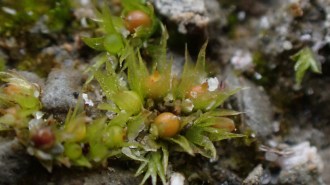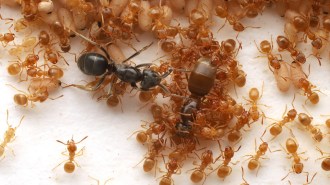All Stories
-
 Plants
PlantsMoss spores survived in space for 9 months
The moss species Physcomitrium patens is the latest organism to survive an extended stay in the vacuum and radiation of space.
By Jay Bennett -
 Health & Medicine
Health & MedicinemRNA flu vaccines are making their way through clinical trials
The mRNA platform offers the advantage of faster vaccine production, which could allow more time to decide on which flu strains to cover.
-
 Health & Medicine
Health & MedicineIn animal tests, this needle-free insulin acted as fast as injections
Managing diabetes with injections is challenging. Joining insulin to a skin-penetrating polymer was as effective as shots at regulating blood sugar.
By Simon Makin -
 Health & Medicine
Health & MedicineEroding access to childhood vaccines jeopardizes health for all
Recent U.S. decisions about vaccines signal bigger changes to come that could threaten the foundation of the national childhood immunization schedule.
-
 Oceans
OceansCombining western science with Indigenous knowledge could help the Arctic
Polar marine ecologist Marianne Falardeau investigates how Arctic ecosystems are shifting under climate change.
By Nikk Ogasa -
 Science & Society
Science & SocietySee the alarming extent of NIH and NSF funding cuts in 2025
In 2025, the Trump administration froze or ended about 5,300 NIH and NSF research grants totaling over $5 billion in unspent funds, a decision that reshaped many fields of science.
- Artificial Intelligence
Chatbots may make learning feel easy — but it’s superficial
People who use search engines develop deeper knowledge and are more invested in what they learn than those relying on AI chatbots, a study reports.
By Payal Dhar -
 Science & Society
Science & SocietyFunding chaos may unravel decades of biomedical research
Battles between the Trump administration and academic institutions are putting important biomedical advances in limbo.
-
 Archaeology
ArchaeologyA clay figurine unveils a storytelling shift from 12,000 years ago
A carefully crafted figure of a goose and a woman suggests that art reflecting spiritual beliefs entered a new phase among early villagers in the Middle East.
By Bruce Bower -
 Animals
AnimalsA wolf raided a crab trap. Was it tool use or just canine cunning?
Video from the Haíɫzaqv Nation Indigenous community shows a wolf hauling a crab trap ashore. Scientists are split on whether it counts as tool use.
By Elie Dolgin -
 Animals
AnimalsThis parasitic ant tricks workers into committing matricide
Newly mated parasitic queen ants invade colonies and spray their victims with a chemical irritant that provokes the workers to kill their mother.
-
 Climate
ClimateLife-saving research on extreme heat comes under fire
The Trump administration’s cuts to heat research come at a time when climate change is making extreme heat waves more common and intense.
By Nikk Ogasa